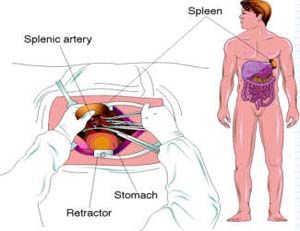Gastric Splenectomy Surgery India
Splenectomy:

A splenectomy is a procedure that involves the removal of the spleen by operative means.
Indications
The spleen, similar in structure to a large lymph node, has historically held rather a mythical role but current knowledge of its purpose includes the destruction of old red blood cells and platelets and the detection and fight against certain bacteria. The spleen is enlarged in a variety of conditions such as malaria, glandular fever and most commonly in "cancers" of the lymphatics such as lymphomas or the leukaemia.
It is removed under the following circumstances:
When very large such that it becomes destructive to platelets/red cells, For diagnosing certain lymphomas
- When platelets are destroyed in the spleen as a result of an auto-immune process (see also idiopathic thrombocytopenic purpura)
- When the spleen bleeds following physical trauma
- Following spontaneous rupture
- For long-term treatment of congenital erythropoietic porphyria (CEP) if severe hemolytic anemia develops
The classical cause of traumatic damage to the spleen is a motorcycle accident where one end of the handlebars strikes the abdomen.
Procedure
In general, spleens are removed by laparoscopy (minimal access surgery) when the spleen is not too large and when the procedure is elective. It is performed by open surgery for trauma or large spleens. Both methods are major surgeries, and are performed under general anesthesia. The spleen is located and disconnected from its arteries. The ligaments holding the spleen in place are dissected and the spleen is removed. When indicated a drain is left in place and the incision(s) is closed. If necessary, tissue samples are sent to a laboratory for analysis.
Side effects
Because splenectomy causes an increased risk of overwhelming sepsis due to encapsulated organisms (such as S. pneumoniae and Haemophilus influenzae) the patient should be immunized, if possible, prior to removal of the spleen; see asplenia for advice.[2][3] Failure to do so later puts the patient at risk of overwhelming post-splenectomy infection (OPSI), a potentially rapidly fatal septicaemia. These bacteria often cause a sore throat under normal circumstances but after splenectomy, when infecting bacteria cannot be adequately opsonized, the infection becomes more severe.
Following splenectomy, the platelet count may rise to high levels in blood leading to an increased risk of clot formation and death.
Gastric Splenectomy Surgery in India is available in following cities:
| Mumbai | Hyderabad | Kerala |
| Delhi | Pune | Goa |
| Bangalore | Nagpur | Jaipur |
| Chennai | Gurgaon | Chandigarh |
Go to the Enquiry Form
Phone Numbers Reach Us
India & International : +91-9860755000 / +91-9371136499
UK : +44-2081332571
Canada & USA : +1-4155992537
Below are the downloadable links that will help you to plan your medical trip to India in a more organized and better way. Attached word and pdf files gives information that will help you to know India more and make your trip to India easy and memorable one.
 Apollo Hospital
Apollo Hospital Fortis Hospital
Fortis Hospital Artemis Hospital
Artemis Hospital
 Medanta Hospital
Medanta Hospital



 Jaslok Hospital
Jaslok Hospital Lilavati Hospital
Lilavati Hospital

 Global Hospitals
Global Hospitals Jupiter Hospital
Jupiter Hospital













